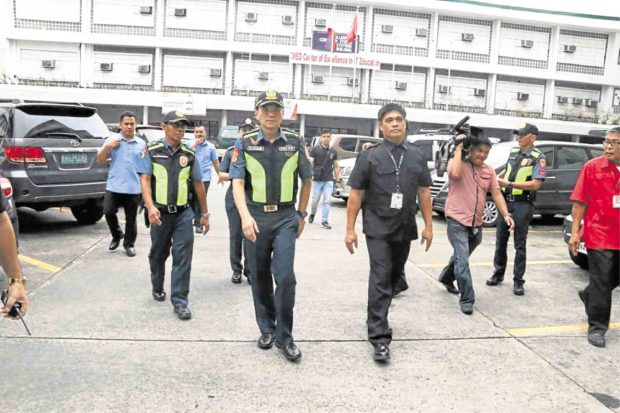
SCHOOL SAFETY Top Metro police chief Maj. Gen. Guillermo Eleazar (center) inspects schools in Manila to ensure their readiness and safety for the opening of classes. —PHOTO COURTESY OF NCRPO
MANILA, Philippines — More than 7,000 policemen will be deployed all over Metro Manila not only to hunt down criminals but also to look for explosive devices, and apprehend overloaded and “colorum” school buses to ensure the safety of students when classes resume next week.
A total of 7,153 police officers of the 29,000-strong National Capital Region Police Office (NCRPO) would be manning the vicinities of schools and other crime prone areas as the new school year for elementary and high school students starts on June 3, according to NCRPO chief Maj. Gen. Guillermo Eleazar.
Police assistance desks
Police visibility and police assistance desks would be in place “in anticipation of criminal elements such as pickpockets and snatchers who may take advantage of innocent students during the opening of classes,” he said.
There are no current bomb threats in the metropolis, but Eleazar said the NCRPO had established a new protocol on how police and schools should respond to bomb threats.
According to Eleazar, all schools should each have a designated contact person or marshals who would immediately act and respond to a bomb scare.
They would then report the incident to the nearest police station, while the Explosives and Ordnance Division would search and if necessary, disarm or detonate explosive devices.
Most of the bomb scares in Metro Manila since last year, however, turned out to be hoaxes.
Eleazar has also ordered a crackdown on overloaded and out of franchise tricycles, motorcycles, jeepneys and other school service vehicles “for the protection of our children.”
The Land Transportation Franchising and Regulatory Board last year wanted to ban the use of tricycles to ferry children to and from their schools.
Overloaded tricycles
Former LTFRB board member Aileen Lizada noted the proliferation of overloaded tricycles, which were not only illegal but also unsafe.
Most tricycles should carry only four passengers at the most, but some tricycle drivers opted to carry up to nine passengers.
Many families chose to hire tricycles than school buses since the former is cheaper. Tricycle services can range from P300 to P700 per month, while buses charge up to P4,000, depending on the distance from home to school.
According to the 2018 Metro Manila Accident and Reporting Analysis System, a total of 7,662 tricycles were involved in road crashes, of which 19 led to deaths.

